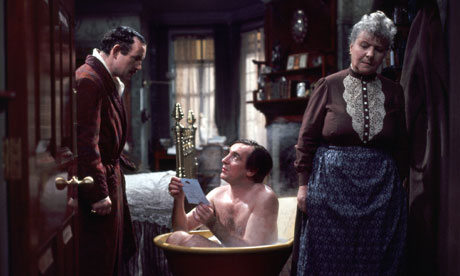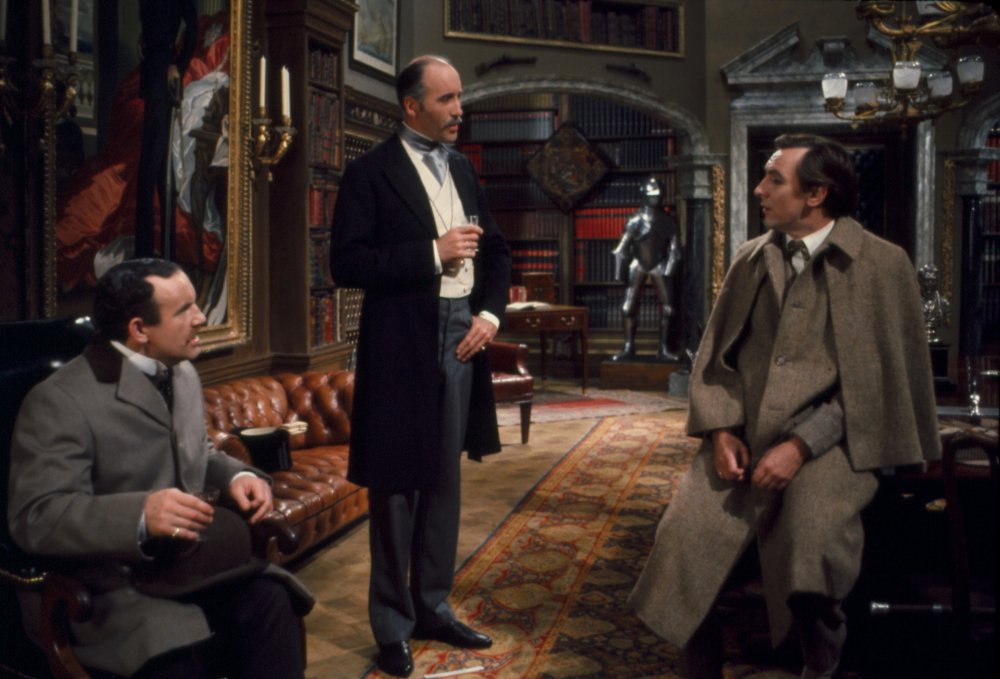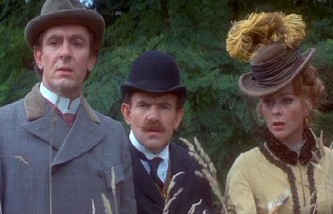Old Person's Holmes
I recently posted something about the career of writer-director Billy Wilder. Many see a demarcation between his earlier films written with Charles Brackett and his later written with I.A.L. Diamond. This is fair, as far as it goes, but while many pick Brackett as the superior collaborator, I'd say Wilder made great films with both, as well as some great stuff without either.
But there's another line you can draw--a major turning point is his "late" films, that just don't have the zing of his earlier stuff. Some have made a case for these later films (auteurists love it when directors slow down and revisit old themes), but at the very least he'd lost the zeitgeist. When a popular artist no longer makes hits, there's a good chance something is missing.
All of this is prologue to seeing one of his later films--The Private Life Of Sherlock Holmes--in a theatre recently. I consider it his first "late" film. Seeing it on TV years ago, I was not impressed. Have my impressions (or have I) changed?
A little.
It's no classic--whereas the last of his old-style films, The Fortune Cookie (1966), is a near-classic--but it does have its charms. Of course, what we're seeing is a hacked-up version of Wilder's intentions. The original was planned as a three-hour epic but, afraid they had a white elephant, United Artists chopped it to pieces.
The main story deals with a mysterious woman showing up at 221B Baker Street, not knowing who she is or what she's doing there. Holmes and Watson unravel her story, which takes them into Scotland and a fairly complex plot.
The film is different for Wilder in that, for once, he's not using big names. His Hollywood career is studded with major stars, and there was talk early on of Peter O'Toole and Peter Sellers for Holmes and Watson, but Wilder went with Robert Stephens and Colin Blakely. I think this is a mistake--there's a reason these two never went on to become big names.
He's also going more for beauty than usual. He was always a good director with memorable visuals, but he was also efficient, trying to serve the story. In Sherlock Holmes, there's a lot of location shooting which doesn't add much--may even slow things down a bit.
Above all, of course, there's the writing. Wilder always wrote clear, forward-moving plots, but he never quite gets his footing in this non-American period piece. He can't help but be entertaining, and even funny occasionally, but it's not the witty, sophisticated, clockwork mystery we expect from Holmes and Watson.
Also, I think Wilder--and Diamond--miscalculated. Holmes keeps running into his condescending brother, Mycroft (Christopher Lee, biggest name in the cast). Fine. But then, as we get near the climax, Mycroft invites Holmes over and explains everything to him. We're here to see Holmes solve the mystery--and be in danger while doing so--not have it handed to him on a silver platter, especially after he's been too stupid to see what's under his nose.
The film was an expensive flop. Wilder would go on to direct four more films, none of them well-received, none of them major hits. Perhaps it was the end of the Production Code that did him in. He'd always been pushing the envelope, so when the envelope disappeared, he seemed more an old man trying to be with it. Compare Sherlock Holmes to Wilder's Irma La Douce in 1963. Both are colorful and lengthy, but Irma was Wilder's biggest money maker. It's not a great film, but it's bouncy and fun and deals with a naughty subject--prostitution--that wasn't everyday Hollywood product of the time. But Holmes comes out in an age of Bonnie And Clyde and Easy Rider, so intimations of drug use and homosexuality didn't titillate as they once might have.
Still--perhaps because of low expectations--I did enjoy it. The film moves along pretty smoothly and goes down easy. Don't listen to those calling it a lost classic, but you could do a lot worse.





2 Comments:
What I want to know about is the other Old Person Holmes, the one in theaters now. Tolerable? Worth nine Midwestern dollars?
The reviews have been decent but I haven't seen it yet. I expect to get around to it eventually and you can find out what I think in my annual film wrap-up.
Post a Comment
<< Home